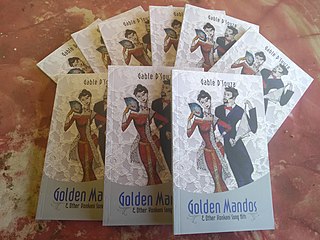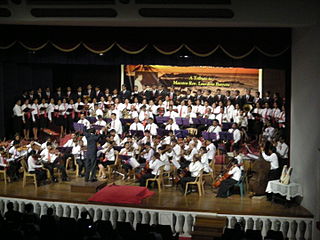Related Research Articles

Konkani is an Indo-Aryan language spoken by the Konkani people, primarily in the Konkan region, along the western coast of India. It is one of the 22 scheduled languages mentioned in the Indian Constitution, and the official language of the Indian state of Goa. It is also spoken in Karnataka, Maharashtra, Kerala, Gujarat as well as Damaon, Diu & Silvassa.

Goan literature is the literature pertaining to the state of Goa in India.

Music of Goa refers to music from the state of Goa, on the west coast of India. A wide variety of music genres are used in Goa ranging from Western art music to Indian classical music. Konkani music is also popular across this tiny state. Being a former territory of Portugal, Goa has a dominant western musical scene with the use of instrument such as the violin, drums, guitar, trumpet and piano. It has also produced a number of prominent musicians and singers for the world of Indian music. Portuguese Fado also has significance in Goa.
Goa is a state of India. Goans are commonly said to be born with music and football in their blood because both are deeply entrenched in Goan culture.
The Konkani people are an Indo-Aryan ethnolinguistic group native to the Konkan region of the Indian subcontinent. They speak various dialects of the Konkani language. Following the Konkani language agitation, Konkani became the premier official language of Goa state, while Marathi remains as the associate official language of Goa. Konkani is also spoken by populations in Karnataka, Maharashtra, Damaon, Kerala, & Gujarat. A large percentage of Konkani people are bilingual.
The island of Divar lies in the Mandovi river in the Indian state of Goa.
Goan Catholics are an ethno-religious community of Indian Christians adhering to the Latin Rite of the Catholic Church from the Goa state, in the southern part of the Konkan region along the west coast of India. They are Konkani people and speak the Konkani language.
Goans is the demonym used to describe the people native to Goa, India, who form an ethno-linguistic group resulting from the assimilation of Indo-Aryan, Dravidian, Indo-Portuguese, Austro-Asiatic ethnic and/or linguistic ancestries. They speak different dialects of the Konkani language, collectively known as Goan Konkani. "Goanese", although sometimes used, is an incorrect term for Goans.
Goan Catholic literature is diverse.

Agnelo Gustavo Adolfo de Souza S.F.X., was a Goan Roman Catholic priest of the Society of the Missionaries of St. Francis Xavier, Pilar who performed missionary work in the province of Goa, then part of Portuguese India. The cause for his canonization has been accepted for investigation by the Holy See, and has progressed to the point that he has been declared Venerable.
Moreno de Souza was a Goan Jesuit priest and Konkani Marian poet, Konkani writer, translator and a historian. He was one of the translators of the Povitr Pustok in Romi Konkani.

Konkani in the Roman script, commonly known as Roman Konkani or Romi Konknni refers to the writing of the Konkani language in the Roman script. While Konkani is written in five different scripts altogether, Roman Konkani is widely used. Roman Konkani is known to be the oldest preserved and protected literary tradition beginning from the 16th century AD.

The Santa Cecilia Choir is a polyphonic male choir composed of seminarians of the Rachol Seminary of the Catholic Archdiocese of Goa and Daman in Goa, India.
The history of Bible translations into the Konkani language begins with Ignazio Arcamone (1615–1683), an Italian Jesuit working in Salcette, Goa was the first to translate parts of the Bible to Konkani language. It was published under the title "Sogllea Vorunsache Vanjel" from Rachol Seminary Printing Press in 1667. Copies of this book are not available.
Goa is India's smallest state on the west coast, and its writers have written in many diverse languages. Poetry is a small and scattered field in the region, and this page makes an attempt to acknowledge those who have contributed to the field. It includes those listed below who have contributed to poetry in and from Goa, as well as those writing poetry in Goa. Poetry related to Goa is known to have been written in Konkani, in Portuguese, English and Marathi, apart from other regional, national and international languages to a lesser extent.
Vasco do Rego was an Indian Jesuit priest who played a significant role in the promotion of Konkani language, literature and music, particularly after the Annexation of Goa. He was the editor of the religious monthly Dor Mhoineachi Rotti for many years.

Konkani liturgical music refers to the sacred music used in the liturgy in the Konkani language. Konkani is used in liturgy in the Archdiocese of Goa and Daman, and the dioceses of Mangalore, Karwar, Udupi and Sindhudurg.

John Aguiar is an Indian Konkani poet, writer, songwriter and journalist whose songs have been broadcast over the All India Radio network, mainly in Goa and on CDs.
Caridade Damaciano Fernandes was a prolific Goan Konkani novelist and a pioneer of prose fiction writing in that language. He has been called "the father of Konkani novels". Caridade Damacian died on October 7, 1948, but yet his legacy is still remembered and celebrated.

Brazinho de Santa Nunila Soares, known by his pen name Brazinho Soares Kalapurkar, is an Indian writer, playwright, theatre actor, theatre critic, theatre archivist, and former singer known for his work in tiatr productions.
References
- ↑ "Documenting memories of catholic devotions | UCAN India". www.ucanindia.in. Archived from the original on 6 June 2016.
- ↑ "Goan Voice, Canada: People Places and Things".
- 1 2 Misquita, Melvin (14 December 2014). "The Sound Of Konkani Gospel Music". O Heraldo . Panaji. Archived from the original on 9 March 2017.